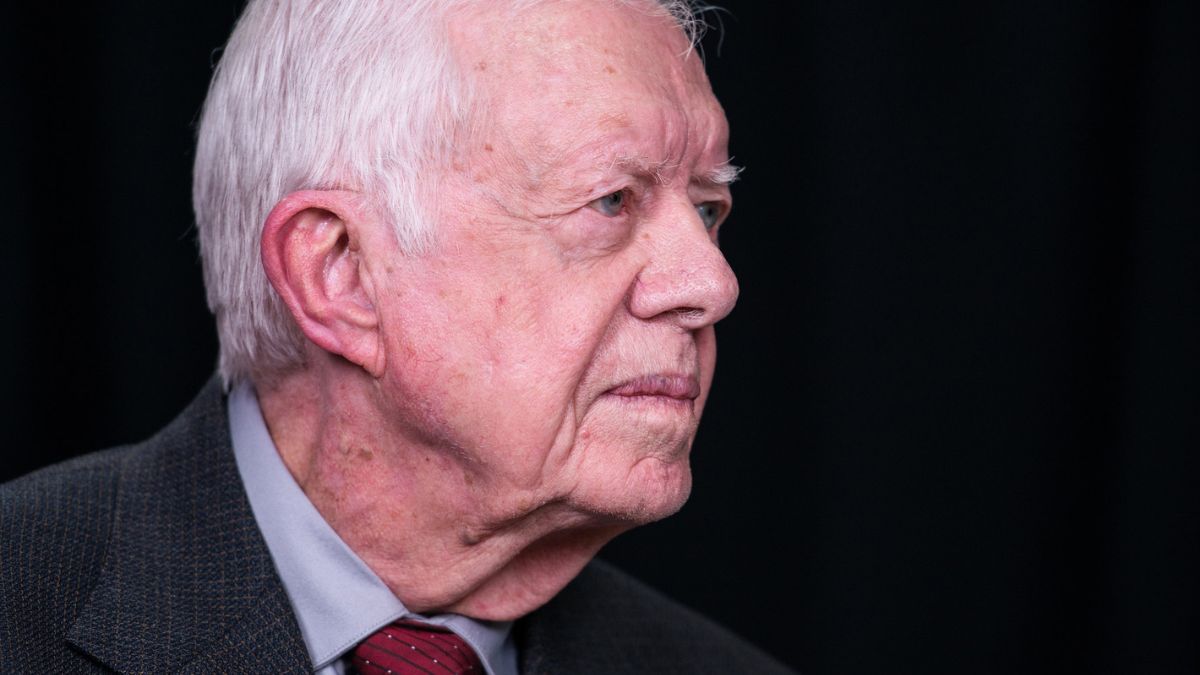Photo Credit: LBJ Library/Public Domain
By James S. Bridgeforth, Ph.D.
On Sunday, Dec. 29, the world bid farewell to a titan of democracy, a man whose life was a testament to the enduring power of service, integrity and humanity.
Former President Jimmy Carter, who passed away at the age of 100, leaves behind a legacy that transcends his years in the White House. He was a man who, through quiet yet transformative leadership, changed the course of American history—both domestically and abroad. He was, in every sense, a servant of the people. And for that, his legacy will forever shine as one of the brightest in American history.
Born James Earl Carter Jr. in 1924 to a family of modest means, Carter’s story is one of perseverance and profound personal growth. Raised on a peanut farm in rural Georgia, he learned the values of hard work, discipline and self-reliance from an early age.
His education at the U.S. Naval Academy set him on a path to become a naval officer, where he distinguished himself as part of the nation’s nuclear submarine program, ultimately serving as the senior officer aboard the “Seawolf”, the U.S. Navy’s second nuclear-powered submarine.
But even in his military career, it was Carter’s capacity for leadership and a deep sense of duty to others that set him apart.
In 1946, Jimmy Carter married Rosalynn Smith, a union that would last 77 years, one of the longest in American political history. Their relationship was not just a personal bond but a partnership of shared values that extended into the political and humanitarian work they would undertake together for decades.
When Carter’s father passed away in 1953, he made the difficult decision to leave the Navy and return home to Georgia to manage the family farm. But politics, like destiny, had a different plan.
Carter’s rise to political prominence began in local Georgia politics, where he was elected to the Georgia State Senate. In 1970, after an unsuccessful bid for governor four years earlier, Carter emerged victorious in the race for Governor of Georgia. His victory marked the beginning of a new chapter—not just for Georgia, but for the nation.
As Governor, Carter didn’t just talk about change; he embodied it.
At a time when the South was still deeply entrenched in racial segregation, Carter made bold moves toward equality and civil rights. On his first day in office, he declared that “the time for racial discrimination is over.”
This was not just a political statement—it was a moral imperative.
His administration appointed African Americans to state offices, fought to dismantle disenfranchising voting laws, and, importantly, stood as a Southern voice that challenged the very foundations of segregation. He took risks for civil rights when doing so could have cost him politically.
Carter’s leadership was unique. He didn’t just champion civil rights from the position of a liberal progressive or an outsider; he did so as a Southern white man, from a family whose history was tied to segregation.
His example forced many white Southerners to reckon with their own views on race. He turned his back on the politics of the past and charted a course that would help heal the wounds of the nation.
By doing so, he helped pave the way for African Americans to engage more deeply in the political process, inspiring generations to come. His election in 1976 was not only a victory for progressive values but a direct blow to the racial politics of George Wallace, who had risen to prominence as a symbol of segregationist resistance.

Despite the challenges of his presidency, including the Iran hostage crisis and economic struggles at home, Jimmy Carter’s impact on the world stage was immeasurable.
His post-presidential work was where his true legacy would be etched in the annals of history. In 1982, he and his wife Rosalynn founded “The Carter Center”, a nonprofit organization dedicated to promoting peace, alleviating human suffering and advancing human rights.
Through this platform, Carter led international efforts to combat diseases like Guinea worm disease, helped broker peace deals in the Middle East and became a tireless advocate for democracy worldwide. His work in areas of conflict resolution, particularly in Africa and the Middle East, earned him the Nobel Peace Prize in 2002, solidifying his role as one of the preeminent global advocates for peace and justice.
Though Carter’s presidency was marred by significant challenges, his post-presidential years were a profound testament to the values that truly define leadership.
Unlike many former presidents, Carter didn’t retreat from the world after leaving office. Instead, he devoted himself to making the world a better place, showing us that leadership doesn’t end when the term does—it is a lifelong calling.
In the end, what set Jimmy Carter apart was his character—a man of profound humility, fierce determination, and an unwavering commitment to the idea that service to others is the highest calling. His actions were not driven by ambition or the pursuit of power, but by a desire to make the world more just, more humane, and more peaceful.
Through his work at The Carter Center, his advocacy for civil rights, and his international diplomacy, he leaves a legacy that will endure long after his death.
Time Magazine recently declared Jimmy Carter as “the best former president America ever had.”
It is a fitting tribute to a man whose post-presidential work far surpassed the limits of partisan politics and whose contributions to humanity will continue to reverberate through the corridors of history.
Jimmy Carter’s life reminds us that leadership is not defined by titles or accolades, but by the impact we have on the lives of others. He led with compassion, integrity and a deep sense of moral clarity—a legacy that will continue to inspire generations.
In the end, Carter’s life reminds us that the true measure of a man is not in what he achieves for himself, but in what he does for others.
His life’s work stands as a beacon of hope for a better, more compassionate world—one in which service, peace and justice are always the guiding principles.

Bridgeforth enjoys writing as a political columnist who is a passionate advocate for justice and equality whose academic journey reflects a profound commitment to these ideals. With a bachelor’s degree in Sociology from Catawba College, Bridgeforth began his quest to understand and address systemic inequalities. He furthered his expertise with a master’s degree in Higher Education Administration from The University of Massachusetts-Amherst, followed by a Ph.D. in Higher Education Administration and Institutional Research from The University of Southern Mississippi.
Beyond his impressive academic credentials, Bridgeforth is deeply involved in organizations dedicated to empowerment and community service, including Alpha Phi Alpha Fraternity, Inc. and 100 Black Men of America. His columns provide insightful commentary on equal opportunity, social justice, economic equity, and higher education, driven by a sincere desire to amplify voices and champion the causes of those often marginalized.
Through his writing, Bridgeforth brings a blend of scholarly rigor and heartfelt advocacy, aiming to inspire change and foster a more just society for all.



